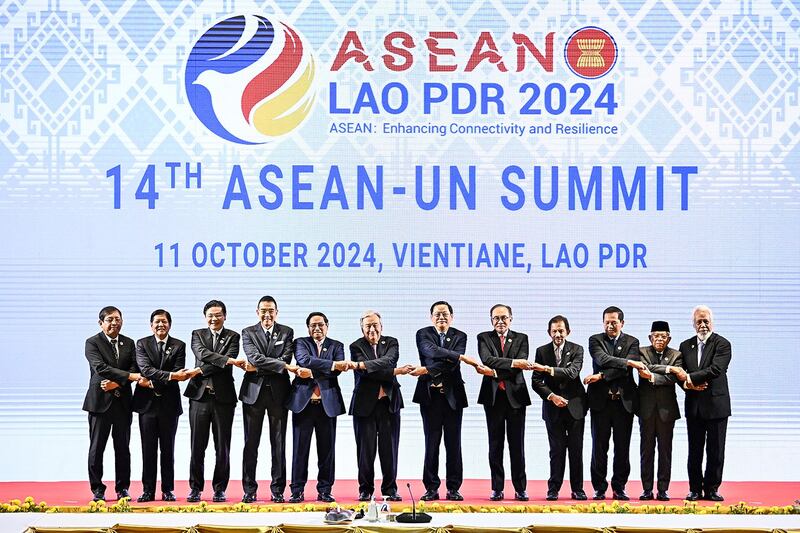[ Read RFA coverage of this topic in Burmese. Opens in new window ]
The chair of the Association of Southeast Asian Nations called for an end to the war in Myanmar, but armed rebel groups called that “unrealistic,” saying the ruling military junta has shown no willingness to dialogue.
In Sunday’s statement, Laos – this year’s chair of the 10-nation group, whose leaders gathered last week in Vientiane – called for inclusive peace talks to end the civil war, which has raged since the military seized power in a February 2021 coup d’etat.
It also called on Myanmar to establish a "conducive environment for the delivery of humanitarian assistance and inclusive national dialogue," using the bloc’s “five-point consensus” as a guideline to resolve the country’s political crisis.
Rebel groups in Myanmar were quick to dismiss the call, saying the onus is on the junta.
"It depends on the junta,” said Salai Htet Ni, the spokesperson of the ethnic Chin National Army. “How can the junta be flexible? Actually, the junta failed to implement any of the five-point consensus that ASEAN put forth.”
ASEAN’s call is “very unrealistic” due to the junta’s actions, said Lway Yay Oo, spokesperson for the Ta’ang National Liberation Army, which has been fighting the military in the north. The TNLA would consider dialogue only if the military leaves politics after acknowledging responsibility for war crimes, she said.
Not long after the coup, ASEAN proposed a five-point peace plan for Myanmar, which the grouping calls a “consensus,” including a ceasefire and talks. But Myanmar’s generals have ignored it, battling on against a loose alliance of ethnic minority forces and pro-democracy fighters who have this year been making significant battlefield gains.
RELATED STORIES
[ As Myanmar’s census draws to a close, observers question its accuracyOpens in new window ]
[ Myanmar’s junta presses ahead with census before proposed electionOpens in new window ]
[ EXPLAINED: Why does Myanmar’s junta want to hold elections?Opens in new window ]
[ ASEAN faces tests in tackling Myanmar war, South China Sea tensionsOpens in new window ]
The ASEAN statement drew a rebuke from Myanmar’s shadow National Unity Government, or NUG, which was formed by officials deposed in the military’s putsch.
“Instead of demanding 'to resolve the crisis peacefully,’ ASEAN should have urged the junta and its chief, [Senior Gen.] Min Aung Hlaing to release all political prisoners unconditionally as a first step,” said Nay Phone Latt, spokesman for the NUG’s Prime Minister's Office.
Aung Kyaw Moe, the junta’s permanent secretary of the Ministry of Foreign Affairs, joined the most recent ASEAN summit despite Myanmar’s downgrade within the bloc due to the junta’s continued use of violence against the opposition.
The junta had boycotted earlier meetings, and observers told RFA last week that they saw the move as part of a bid by the military regime to "seek a way out of the current political crisis."
‘Significant divide’ to bridge
Speaking to RFA on condition of anonymity due to security concerns, a commentator on ASEAN affairs noted that while the bloc has engaged with the junta in peace-building efforts, it has seen few results.
"ASEAN might have considered that they could persuade the Myanmar junta to join political dialogue after they held talks at the summit,” he said. “However, the bloc has yet to make any progress.”

The analyst said it remains to be seen how ASEAN will bridge “the significant divide” between Myanmar's junta and the armed opposition.
Attempts by RFA to contact junta spokesperson Major Gen. Zaw Min Tun for comment on the ASEAN chair’s statement went unanswered.
A former military officer, who also declined to be named citing fear of reprisal, told RFA that an all-inclusive peace dialogue will happen only if the junta gains “a significant military advantage” over opposition forces.
The junta offered a peace dialogue at the end of September, but it was rejected by the opposition.
Observers suggested the peace proposal was a “trick,” that would allow the junta to hold elections.
The junta is holding a national census from Oct. 1-15 that will be used to draw up voter lists for an election they say will restore democratic rule – though opponents are doubtful.
Ethnic minority armies and rebel groups that have taken control of vast swaths of territory once held by the military oppose the election, saying it will be a sham and only serve to legitimize the junta’s control.
Translated by Aung Naing. Edited by Joshua Lipes and Malcolm Foster.
